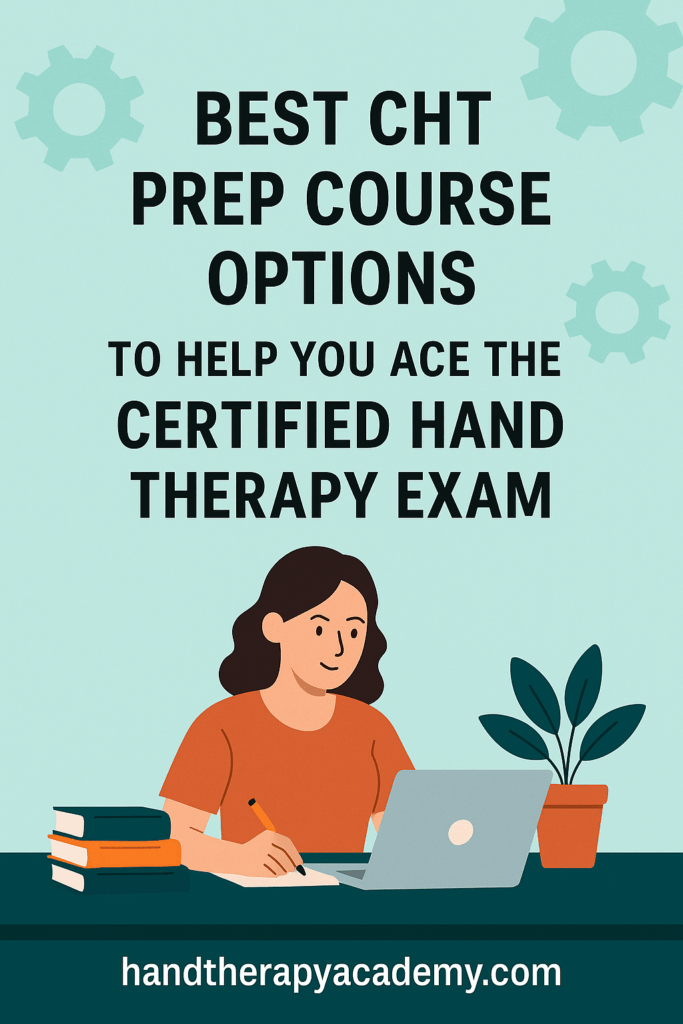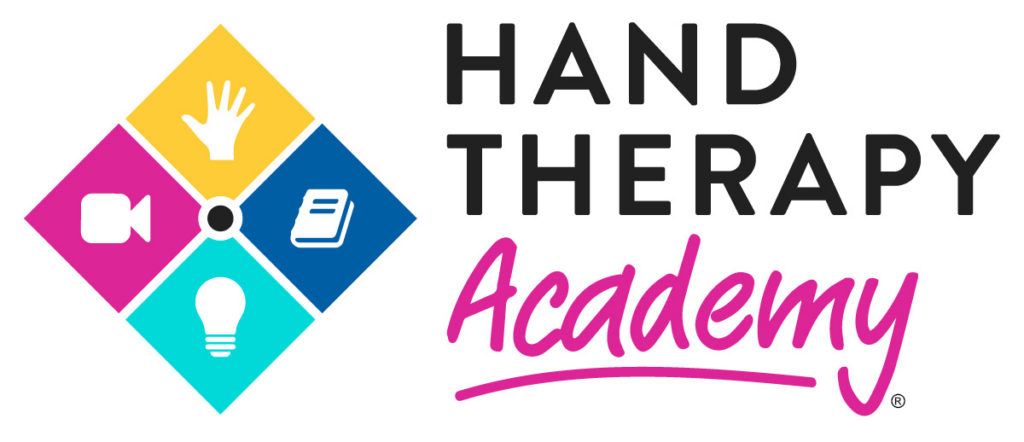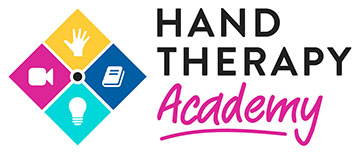Best CHT Prep Course Options to Help You Ace the Certified Hand Therapy Exam
Filed under Uncategorized
Preparing for the Certified Hand Therapist (CHT) exam can be daunting—but the right prep course makes all the difference. Whether you’re a busy clinician or a fresh therapist aiming to become a specialist, choosing a high-quality CHT prep course helps streamline your study plan and boost your chances of passing.
In this comprehensive guide, we’ll walk you through everything you need to know about the CHT exam, who needs a prep course, top-rated options in 2025, study strategies, and common challenges—so you can walk into the exam confident and well-prepared.

Understanding the CHT Certification
What is the CHT Exam?
The CHT exam, governed by the Hand Therapy Certification Commission (HTCC), is a rigorous test that evaluates a clinician’s advanced knowledge and clinical expertise in upper extremity rehabilitation.
It covers areas like:
- Anatomy and kinesiology
- Pathologies and surgical procedures
- Evaluation and treatment techniques
- Splinting and therapeutic interventions
Passing the CHT exam earns you the prestigious Certified Hand Therapist credential—a mark of excellence recognized across the rehab industry.
Why Certification Matters in Hand Therapy
Becoming a CHT is more than just a title. It signifies:
- Higher clinical competence
- Greater job opportunities
- Professional recognition
- Potential for increased salary
With only about 6,500 CHTs worldwide, certification sets you apart in a niche field.
Who Should Take a CHT Prep Course?
Eligibility Requirements
Before enrolling in any prep course, make sure you’re eligible to take the CHT exam:
- Minimum of 3 years of clinical experience as an OT or PT
- 4,000 hours of direct hand therapy experience
Occupational vs. Physical Therapists
Both occupational therapists (OTs) and physical therapists (PTs) can become CHTs. However, their approaches to learning might differ:
- OTs may need more review on biomechanical interventions
- PTs might need extra time with splinting and sensory techniques
Key Features to Look For in a CHT Prep Course
When choosing a CHT prep course, keep an eye out for these essential features:
Evidence-Based Content
The best courses rely on peer-reviewed research and clinical guidelines, ensuring the material is accurate and up to date.
Practice Tests and Quizzes
Mock exams mirror the real CHT test format and help gauge your readiness.
Access to Expert Instructors
Courses with board-certified therapists provide deep insights, practical tips, and exam-taking strategies.
How to Choose the Right CHT Prep Course for You
Self-Paced vs. Instructor-Led
- Self-paced works for those balancing jobs or family.
- Instructor-led ensures accountability and real-time support.
Cost vs. Value
A higher price doesn’t always mean better quality. Look at:
- Course duration
- Resources provided
- Pass rate statistics (if available)
Testimonials and Reviews
Real user feedback can be a goldmine. Look for:
- Honest course reviews
- Alumni forums
- Social media groups
Study Tips to Maximize Your CHT Prep Course
Here’s how to stay on track and make the most of your prep investment:
- Set a schedule: Break content into daily or weekly goals.
- Use multiple formats: Combine videos, flashcards, and practice questions.
- Join a study group: Peer accountability boosts consistency.
- Track your progress: Use a study journal or app.
Common Challenges in Preparing for the CHT Exam
| Challenge | Solution |
| Information overload | Focus on high-yield topics |
| Retention of complex material | Use mnemonics and spaced repetition |
| Exam anxiety | Take mock tests to simulate exam day |
| Balancing work and study | Schedule fixed study hours weekly |
Tools and Resources That Complement Your CHT Prep Course
- Anatomy apps: Complete Anatomy, Muscle Premium
- Flashcard platforms: Anki, Quizlet
- Review books: “Orthotic Intervention for the Hand and Upper Extremity”
- Peer networks: Facebook groups like “CHT Exam Study Group”
Hand Therapy Academy Has Everything In One Platform
Hand Therapy Academy is a comprehensive CHT prep program designed to include all of the necessary elements to get members ready to pass the CHT exam.
It includes all of the following, and more:
- 3 full length practice tests
- Online and printable flash cards
- Complete 6 or 12 month schedule to keep you on track
- Online study meetings
- Free anatomy.tv online access
- Over 20 additional online continuing education course
- Weekly study guides organized by topic
- Evidence based treatment guidelines and home program handouts
If you are interested in taking your exam preparations to the next level, Hand Therapy Academy is the one program that includes everything you need to Ace the exam. And with a 98% pass rating we have a proven track record for over 6 years.
Frequently Asked Questions (FAQs)
1. What’s the best CHT prep course overall?
Hand Therapy Academy’s CHT Prep is top-rated for structure and quality.
2. How long should I study for the CHT exam?
Most candidates spend 3–6 months preparing consistently.
3. Can I retake the exam if I fail?
Yes. You can retake the CHT exam up to three times per application cycle.
4. Are CHT prep courses tax-deductible?
Yes, if they are considered continuing education for your profession.
5. How much does a CHT prep course cost?
Prices range from $45 to $500, depending on format and provider.
6. Is the CHT exam difficult?
Yes—it’s comprehensive and detailed. But with focused prep, it’s absolutely passable.
Conclusion: Your Path to CHT Success Starts Here
Becoming a Certified Hand Therapist is a milestone in any therapist’s career. While the exam is challenging, the right CHT prep course can turn anxiety into confidence. Whether you prefer self-paced learning or guided instruction, there’s a course out there that fits your style and schedule.
Invest in your future today—your CHT credential is just one smart decision away.
More To Read
Changes in ROM of the MCP after Trapeziometacarpal Arthrodesis
Rapid Review: Changes in ROM of the MCP after Trapeziometacarpal Arthrodesis Hayashi, M., Kato, H., Komatsu, M., Yamazaki, H., Uchiyama, S., & Takahashi, J. (2021). Changes in the Functional Range of Motion of the Thumb Metacarpophalangeal Joint After Trapeziometacarpal Arthrodesis for Patients With Advanced Trapeziometacarpal Osteoarthritis. The Journal of hand surgery, S0363-5023(21)00613-4. Advance online publication. https://doi.org/10.1016/j.jhsa.2021.09.018. The Skinny: Several published…
Article Review: Trapeziectomy and LRTI: What can patients with CMC osteoarthritis expect 12 months after the procedure?
Janakiramanan, N., Miles, O., Collon, S., Crammond, B., McCombe, D., & Tham, S. K. (2021). Functional Recovery Following Trapeziectomy and Ligament Reconstruction and Tendon Interposition (Trapeziectomy and LRTI): A Prospective Longitudinal Study. The Journal of hand surgery, S0363-5023(21)00304-X. Advance online publication. https://doi.org/10.1016/j.jhsa.2021.04.036 The skinny: Patients with trapeziometacarpal (TMC) osteoarthritis who are candidates for a trapeziectomy and…
Biceps Tenodesis Versus Tenotomy During Arthroscopic Rotator Cuff Repair
Article Review By: Delaney Wright Title: Outcomes of Biceps Tenodesis Versus Tenotomy During Arthroscopic Rotator Cuff Repair: An Analysis of Patients From a Large Multicenter Database Reference: Srinivasan, R. C., Hao, K. A., Wright, T. W., Farmer, K. W., Wright, J. O., Roach, R. P., Moser, M. W., Freidl, M. C., Pazik, M., & King,…
Arteriovenous Malformation (AVM hand)
By: Amalia Garcia Introduction After completing three weeks of my Level II hand therapy rotation, I have seen a wide variety of common upper extremity injuries such as carpal tunnel syndrome, distal radius fractures, mallet finger, flexor tendon lacerations, arthritis, and more. One condition that stood out to me was one that I hadn’t heard…
Sign-up to Get Updates Straight to Your Inbox!
Sign up with us and we will send you regular blog posts on everything hand therapy, notices every time we upload new videos and tutorials, along with handout, protocols, and other useful information.






